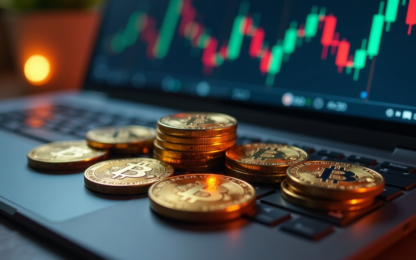
Four things we learned from financial results this earnings season
- The magnificent seven stocks have all reported financial results now, as earnings season begins to wane.
- That's because financial results from big companies can give clues as to what lies ahead for 2024.
- From big oil to luxury brands and Nvidia, here's what we learned.
Earnings season is an exciting yet mixed time for investors. It shows what has gone on behind closed doors in companies the past quarter – or financial year – but it also provides clues as to the future.
Here, four things we’ve learned about how 2024 is likely to go from this earnings past earnings season:
- Oil is not yet over
- The AI boom is just getting started
- The luxury industry may be making a comeback
- Banking is divisive at the moment – with big winners and big losers
1. Oil is not quite over – yet
Copy link to sectionDespite the world declaring its intent to transition away from oil – or perhaps because of it – we saw some of the lushest financial results for shareholders come from big oil companies this earnings season.
For some this was routine. ExxonMobil, for instance, is famous for having increased its dividend every payout for more than forty years now.
But others, especially those U.S. big oil companies profiting off the back of the bumper recent months American oil supply has been having, simply could afford to.
Chevron, for example announced during this past earnings season that it would increase its quarterly dividend for all of 2024 by almost eight percent each. This will put EPS for shareholders at $1.63 per share – a dividend yield of almost five percent.
This, plus the recent news that Warren Buffett’s Berkshire Hathaway is buying more Chevron these days, proves that big oil isn’t quite dead in the ground for investors yet.
2. The AI boom is just getting started
Copy link to sectionThis earnings season saved one of the best for one of the last, when Nvidia reported its Q4 2023 financial results.
In truly jaw-dropping financial results, the company reported EPS had increased more than 700 percent year-on-year to sit at $4.93 per share, while profits were similar up an astronomical 265 percent to $21 billion YoY in 2024.
This proved that, as Nvidia CEO Jensen Huang said at the release of the results last week, that “generative AI has reached a tipping point” in becoming a new industry in itself.
3. The luxury industry may be making a comeback
Copy link to sectionFrom fashion to fine dining, cosmetics to champagne, financial results were mixed. While some were looking a little threadbare for many this quarter, others were living the high life.
Luxury supergroup and bellwether stock LVMH came out triumphant with 2023 profits from recurring operations at €22.8 billion, up eight percent YoY.
Compare this to the year before, when revenues were down 13 percent for 2022, in a year of ever-rising interest rates and post-pandemic recovery.
But the Estée Lauder Companies for example (including luxury brands like La Mer, Clinique and Bobbi Brown) reported a seven percent decline in net sales and a slashing if its dividend by 22 cents per share.
Bloomberg has been one of the voices to say 2024 could be better than 2023. But this remains to be seen, as Paris Fashion Week begins and other important luxury landmarks (like Le Mans) remain on the calendar.
4. Banking is divisive – with big winners and big losers
Copy link to sectionIt turns out that it really mattered who you backed as an investor out of the big banks this earnings season.
As the interest rates ‘tide’ begins to go out for bankers, with rate cuts already being priced in for 2024, investors saw who had been swimming how, to paraphrase the famous Warren Buffett phrase.
JPMorgan Chase & Co reported a record net income of $9.3 billion for Q4 and $49.6 billion for the year – officially the largest earnings ever recorded by a U.S. bank.
Meanwhile, Citigroup reported a net loss of $1.8 billion for Q4 2023 and Goldman Sachs reported a noticeable drop in its net earnings for 2023, down from $11.26 billion YoY in 2022 to $8.52 billion. Less than a month later, their employee was found guilty of insider trading.
What this shows is that, in an environment of high interest rates that are soon to fold and increasingly defaulting customers, big banks have been going all in. And while some have reaped larger rewards than ever before, others have done the same with failure.
More industry news







